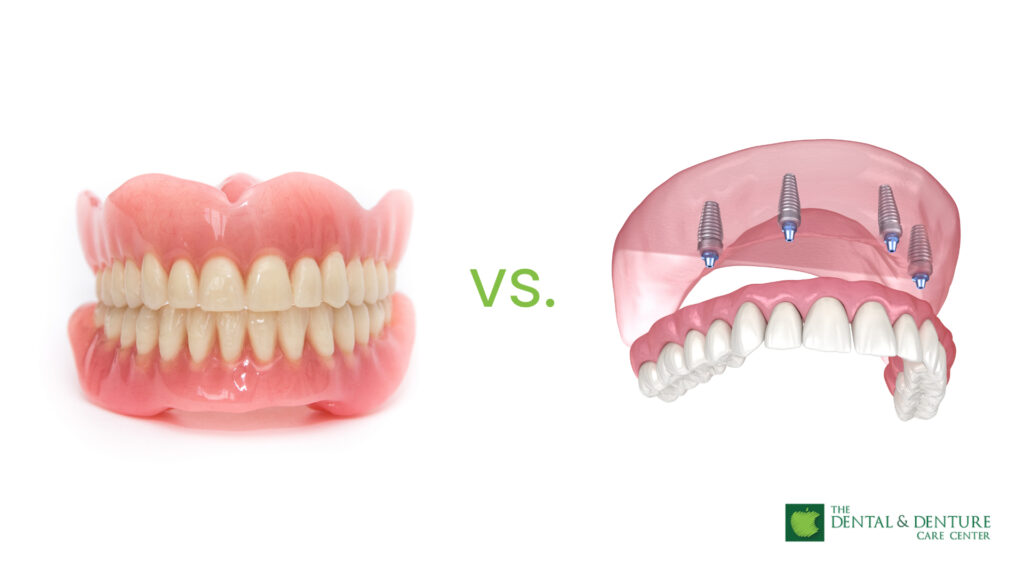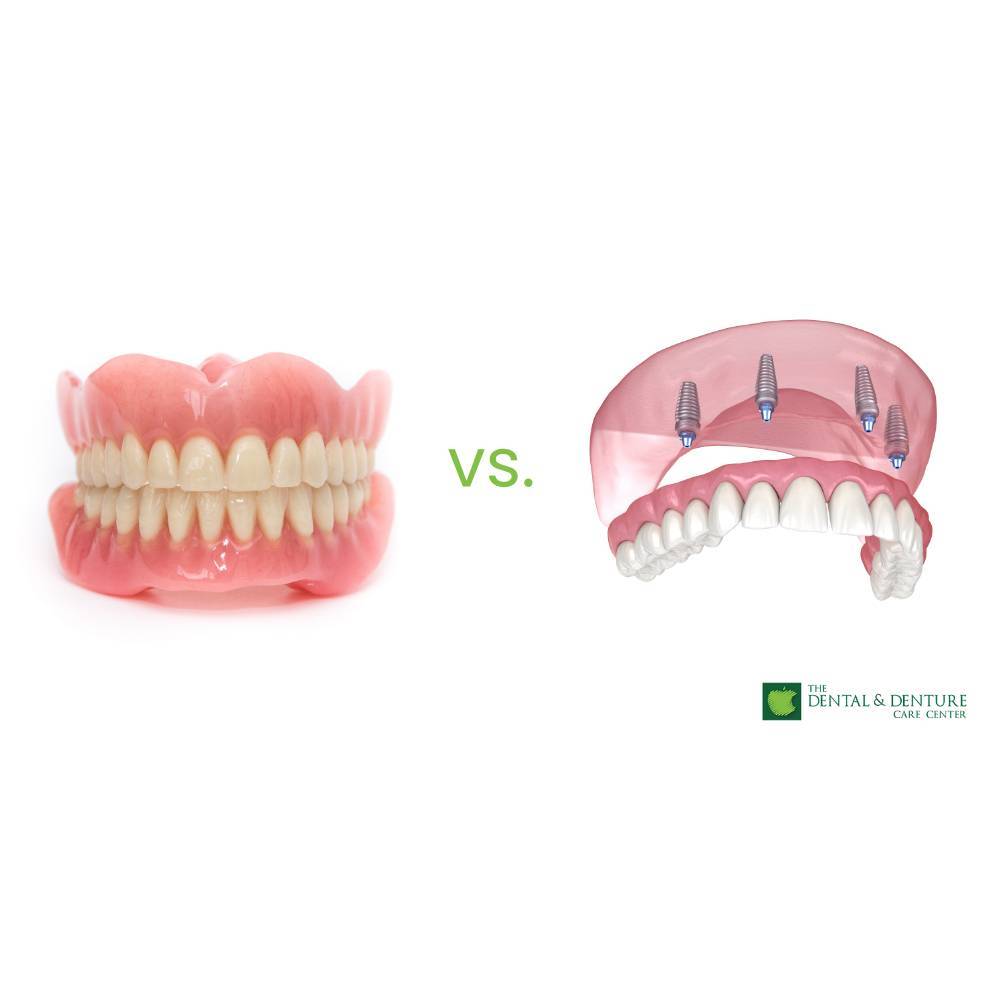Snap-In Dentures (Implant Overdentures) vs Regular Dentures

Having trouble deciding between a snap-in implant overdenture and a conventional denture? In this article we’ll break down the pros & cons to help you decide!
While conventional dentures can be a great option for many patients, there are also a few potential problems that can arise.
Fortunately, there are several options available for those who are dissatisfied with conventional dentures.
Among other things, patients can choose to have their complete mandibular denture custom-made or to have implant-retained dentures.
With proper care and maintenance, these options can help to improve the fit, function, and appearance of dentures, help prevent bone loss or bone resorption and improve the quality of life for those who wear them.
Missing teeth, however, does not mean that you must give up eating the meals you like or smiling readily. Overdentures can be made with implants that improve the fit and function better than traditional dentures and inherently improve stability.
Implant-retained dentures, also called implant overdentures are a type of denture that is retained by implants. Unlike traditional dentures, which rest on the gums, implant overdentures are anchored in place by a few dental implants.
This provides greater stability and prevents the dentures from slipping or moving around in the mouth. In addition, implant overdentures can help to preserve the natural shape of the jaw and improve chewing function.
If you are considering an implant-retained overdenture, this article is for you!
Disadvantages of Conventional Denture

Movement
One of the most common problems with conventional dentures is that they can slip and move around in the mouth, making it difficult to eat and speak. Adapting to dentures can be a complex process. It may take some time to learn how to keep them in place while chewing and speaking.
Poor Fit
Another common problem with conventional dentures is that they may not fit well. They can become loose over time and may need to be relined or replaced.
They also can cause changes in the shape of the mouth over time. If the jawbone shrinks from lack of use, the dentures can become loose and ill-fitting.
Comfort
Conventional dentures can cause irritation and discomfort, as they rub and press against the gums and oral tissue.
Chewing Efficiency
Unlike real teeth which transfer chewing force directly into the bone in the upper & lower jaw via the tooth roots. Conventional complete dentures rest on top of the gums, transferring the force generated by chewing onto the gums, resulting in pain while chewing.
Due to the pain, some wearers report that it is difficult to chew with the same amount of pressure they would use when they had their natural teeth. Resulting in reduced chewing efficiency and/or incomplete chewing of food.
Benefits of a Conventional Dentures
Retain Natural Teeth
For patients who have natural teeth remaining, your dentist may determine that a partial denture can help to restore some function without the need to remove the remaining teeth.
Doesn’t Require Surgery
Because traditional dentures use simple attachment systems like suction and adhesive, implant surgery is not required to install them.
Check our article on what to expect during dental implant surgery.
Inexpensive
Many people choose a traditional removable denture due to cost. They can restore a satisfactory level of chewing function and improve quality of life. However, they do come with a compromise in fit and bite pressure for most patients.
Disadvantages of an Implant Overdenture
Of all of the options available to treat tooth loss and improve oral health, implant overdenture wearers report the highest levels of patient satisfaction. The only downside is the cost. Only a dentist can help you learn if you are a good candidate for this kind of implant-retained dental prosthesis.
There are 2 main cons to consider when choosing an implant-retained prosthesis: cost & implant success after surgery.
Cost of an Implant Overdenture
Although choosing an implant-retained overdenture to replace missing teeth is an expensive option. Many advantages come with the increased cost of installing an implant-retained overdenture. Including better retention of the fixed implant-retained prostheses, less worrying about the attachments coming loose, and no more denture cream!
Minor Surgery is Necessary
Placing dental implants has an extremely high success rate and they take very well without issue for most patients.
At least a few dental implants will need to be installed to provide support for the new dental appliance, treatment plans typically require two or four implants. Installing at least two fixed implants is required if you choose a snap-in denture.
Although the treatment is considered minimally invasive, very comfortable, and has a fast recovery time, it is a surgical procedure nonetheless and is a little more involved than other options.
Benefits of an Implant Overdenture
Securely held in place by Dental Implants
The implant is a metal post that is surgically placed into the jawbone on the edentulous arch (toothless arch). The denture then snaps right in place by snapping securely onto the connector pieces on the implants. What could be easier than that? Many people choose implant overdentures because they are more stable than traditional dentures and implant overdentures can also be more comfortable to wear because they do not put as much pressure on the gums.
Out of all of the benefits, the secure fit and ease of use are often the deciding factor for patients who choose this option at The Dental & Denture Care Center.
Dental Implants Stimulating the Jaw Bone like Real Teeth
By transferring the pressure generated from chewing from the prosthesis directly into the jaw bone, implant-retained overdentures help to stimulate the jawbone like real teeth. This helps the patient preserve bone density and similarly helps to prevent bone resorption as if they had all their natural teeth.
More bone stimulation via implants = less bone loss.
As a result, youthful appearances are a commonly reported benefit as well as the jawline tends to shrink less the more it is stimulated by chewing.
This stimulation is vital for an edentulous mandible. The ease of use and many health benefits implant-supported overdentures provide, make them the preferred choice for a patient who is looking for a long-term oral health solution.
Implant-Supported Overdentures are typically more comfortable.
One of the major advantages of an implant overdenture is comfort.
Implant overdentures are often significantly more comfortable for patients to wear than traditional dentures. Because the forces generated from chewing bypass the gums and go directly into the mandible via one or more implants comfort is greatly improved. Making chewing less painful and the overall denture wearer’s experience better.
Implant-Supported Overdentures allow for more efficient digestion
By not “squishing” the gums with each bite it’s less painful for most patients to use more bite strength and chew food more easily. This ultimately results in better digestion as food can be chewed more thoroughly without pain.
Denture adhesives are not needed
The dental implants hold the denture in place, eliminating the need for any kind of dental adhesive to keep the complete denture secure. With messy denture cream out of the picture, it is common for a patient to report that their food tastes better too.
Are You a Candidate for Implant Overdentures?
If you are missing all of your teeth on your upper jaw or lower jaw, implant overdentures may be a great choice for you! Many patients can bite harder, chew more easily and feel a boost in confidence knowing their dentures won’t fall out at the dinner table! With proper treatment planning, you’ll learn if complete denture implant therapy is a good choice to treat your tooth loss.
If you want to learn if you’re a candidate for implant overdentures, we make it easy.
Our dentist will perform a bone scan as part of your initial consultation, so you’ll know if you have enough available bone and if implant overdentures are an option for you during your first visit to our office! We know it’s pain to run around town to specialists just to find out that they can’t help you. That’s why we pride ourselves on our customer experience and strive to make your dentistry experience as easy and enjoyable as possible.

